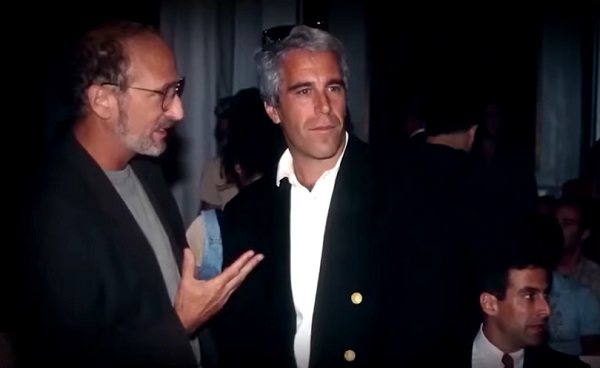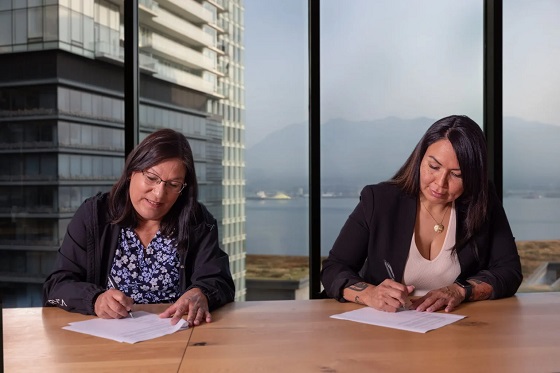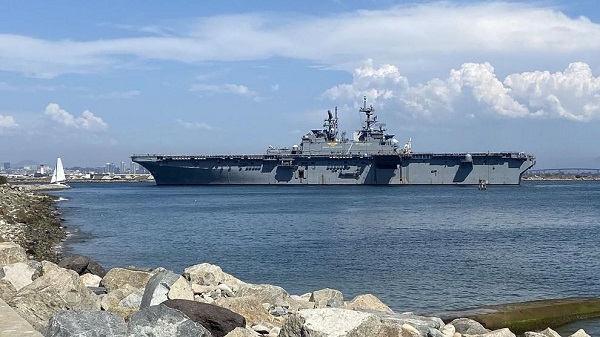Crime
FBI releases incomplete set of files on sex trafficker Jeffrey Epstein, triggering public outcry

From LifeSiteNews
Attorney General Pam Bondi and the public are demanding that the FBI release the full set of files related to the investigation of reported intelligence asset Jeffrey Epstein.
The FBI released about 200 pages of files on Thursday pertaining to sex trafficker and reported intelligence asset Jeffrey Epstein, a mere fraction of the thousands of pages of files said to be in the FBI’s possession.
After a request by the recently created Congressional “Task Force on the Declassification of Federal Secrets” for the complete declassified Epstein files, the FBI issued to Attorney General Pam Bondi’s office what she described as “approximately 200 pages of documents, which consisted primarily of flight logs, Epstein’s list of contacts, and a list of victims’ names and phone numbers.”
Conservative commentator Jack Posobiec, who was among several media pundits spotted on Thursday outside the White House with binders reading “The Epstein Files: Phase 1,” confirmed in a Thursday podcast immediately afterward that the binder contains flight logs and a “rolodex of some of names we already knew from Epstein Black Book.”
Commentator Liz Wheeler, who also received Thursday’s Epstein file binder, confirmed the same, telling on X how Bondi did not discover until Wednesday night that the Southern District of New York “was hiding potentially thousands of Epstein files, defying Bondi’s order to give them all to her.”
“We’re talking recordings, evidence, etc. The juicy stuff. Names,” Wheeler added.
“These swamp creatures at SDNY deceived Bondi, Kash, and YOU. Be outraged that the binder is boring. You should be. Because the evil deep state LIED TO YOUR FACE,” she continued.
In light of this withholding, Bondi on Thursday ordered FBI Director Kash Patel to deliver the “full and complete Epstein files” to her office by Friday at 8 a.m.
She noted in her letter that she learned from a source that “the FBI Field Office in New York was in possession of thousands of pages” of Epstein files.
While some Epstein flight records have been released in previous litigation, they remained limited, as does other information regarding Epstein’s associates. U.S. Sen. Marsha Blackburn filed a subpoena in late 2023 to obtain the complete flight logs, and in January 2025 accused Democratic U.S. Sen. Dick Durbin of blocking her request.
As reported extensively by LifeSiteNews, the Epstein saga has drawn international headlines for years after it became apparent the billionaire sex offender had ties to the Clintons, Prince Andrew, Bill Gates, and other high-profile elites.
Investigative Journalist Whitney Webb has discussed in her book “One Nation Under Blackmail: The Sordid Union Between Intelligence and Crime That Gave Rise to Jeffrey Epstein,” how the intelligence community leverages sex trafficking through operatives like Jeffrey Epstein to blackmail politicians, members of law enforcement, businessmen, and other influential figures.
One example of evidence of this, according to Webb, is former U.S. Secretary of Labor and U.S. Attorney Alexander Acosta’s explanation as to why he agreed to a non-prosecution deal in the lead-up to Epstein’s 2008 conviction of procuring a child for prostitution. Acosta told Trump transition team interviewers that he was told that Epstein “belonged to intelligence,” adding that he was told to “leave it alone,” The Daily Beast reported.
While Epstein himself never stood trial, as he allegedly committed suicide while under “suicide watch” in his jail cell in 2019, many have questioned the suicide and whether the well-connected financier was actually murdered as part of a cover-up.
These theories were only emboldened when investigative reporters at Project Veritas discovered that the major news outlets of ABC and CBS News quashed a purportedly devastating report exposing Epstein.
On December 18, 2023, Senior U.S. District Judge Loretta Preska of the Southern District of New York issued an order to unseal hundreds of documents revealing the identities of individuals who hold various connections to Epstein.
The 4,553 pages of documents then released to the public were heavily redacted and included the names of more than 150 people identified during the investigation of Epstein and his sex trafficking operation. However, many of these individuals had already been identified in previous public documents and interviews, and many were not accused of crimes.
In the final batch of unsealed documents, Epstein victim Virginia Giuffre said he paid her $15,000 in 2011 to have sex with Britain’s Prince Andrew, and that she had sex multiple times with retail mogul Leslie Wexner, who was a financial client of Epstein’s for at least 20 years.
A full list of the names of people mentioned in the previously released Epstein files, including many who have not been accused of any crimes, can be found here. Previously published Epstein flight logs show that former President Bill Clinton along with Secret Service members, actor Kevin Spacey, comedian Chris Tucker, and British model Naomi Campbell all flew on Epstein’s private plane central to his sex trafficking case, dubbed the “Lolita Express” by the media.
Crime
Public Execution of Anti-Cartel Mayor in Michoacán Prompts U.S. Offer to Intervene Against Cartels

“I don’t want to be just another mayor on the list of those executed”
On the first night of November, during Day of the Dead celebrations, the independent, anti-cartel mayor of Uruapan in Michoacán, Carlos Manzo, was assassinated in the heart of his city during a public festival. His bloody murder has underscored the deadly risks faced by local officials who may lack adequate protection from a state that critics say is corroded by corruption and penetrated by powerful cartel networks that, in some regions, have supplanted government authority. The killing intensifies urgent questions about political and police corruption, cartel impunity, and the scope of U.S.–Mexico security cooperation — with a response from the U.S. State Department today offering to “deepen security cooperation with Mexico.”
Manzo, a fiercely outspoken anti-cartel mayor who took office in 2024 as Uruapan’s first independent leader, was gunned down as he stood before crowds at the annual Day of the Dead candlelight celebration. Witnesses said gunfire erupted shortly after Manzo appeared onstage, holding his young son moments before the attack. The festival, known locally as the Festival de las Velas, drew hundreds of families to Uruapan’s central plaza — now transformed into the scene of Mexico’s latest high-profile political assassination, and a catalyst for nationwide outrage, as online protests surged and citizens called for demonstrations against cartel violence.
According to early reports, at least two suspects have been detained and one attacker was killed on site. Authorities asserted — despite the success of the attack — that Manzo had been under National Guard protection since December 2024, with additional reinforcements added in May 2025 following credible threats to his life.
In Washington today, the killing drew political reaction. “My thoughts are with the family and friends of Carlos Manzo, mayor of Uruapan, Michoacán, Mexico, who was assassinated at a public Day of the Dead celebration last night. The United States stands ready to deepen security cooperation with Mexico to wipe out organized crime on both sides of the border,” Deputy Secretary of State Christopher Landau, the former U.S. ambassador to Mexico, said in a statement shared online.
Federal Security Minister Omar García Harfuch said the gunmen “took advantage of the vulnerability of a public event” to carry out the attack, despite a standing security perimeter.
President Claudia Sheinbaum condemned the killing as a “vile” assault on democracy and vowed there would be “zero impunity.” Her administration convened an emergency security meeting and pledged that the investigation would reach the “intellectual authors” of the crime. Yet the murder has already ignited outrage across Mexico over the government’s failure to protect local officials in cartel-dominated states such as Michoacán, where extortion, assassinations, and territorial disputes continue to erode basic governance.
Manzo had publicly warned of his fate. “I don’t want to be just another mayor on the list of those executed,” he said earlier this year, as he pressed the federal government for better coordination between municipal and military authorities. For years, Uruapan — an agricultural and trade hub in western Mexico — has been the site of deadly clashes between the Jalisco New Generation Cartel and remnants of the Knights Templar Organization, both vying to control lucrative extortion and drug routes.
The killing of Manzo fits a dark and familiar pattern. In 2025 alone, several mayors in Michoacán, Guerrero, and Tamaulipas have been killed in attacks widely attributed to organized-crime groups. In June, the mayors of Tepalcatepec and Tacámbaro were ambushed and slain while traveling in official convoys. More than 90 local officials have been murdered since 2018 — a rate that analysts say reflects how cartels target municipal governments to ensure political control over territories tied to narcotics, mining, and agriculture. Uruapan, at the heart of Mexico’s avocado belt, is a strategic prize for the cartels that tax every shipment leaving the region.
The mayor’s death also recalls earlier tragedies that scarred the nation. In 2012, Dr. María Santos Gorrostieta Salazar, the former mayor of Tiquicheo, was abducted and murdered after surviving two assassination attempts and defying cartel threats. Her death became emblematic of the dangers faced by reformers who refuse to cooperate with criminal groups. More than a decade later, Manzo’s murder illustrates that little has changed — except the brazenness of the attackers, now willing to strike in front of cameras and families celebrating one of Mexico’s most sacred holidays.
The killing has also reignited long-standing U.S. frustration over Mexico’s inability to stem cartel violence, even as the Trump administration has expanded counter-narcotics operations at the border. Under Trump’s renewed directives, the U.S. has classified several Mexican cartels as foreign terrorist organizations and empowered the Pentagon to develop strike options against high-value targets abroad. A September 2025 joint statement between Washington and Mexico City pledged deeper intelligence sharing and cross-border enforcement initiatives, including efforts to halt arms trafficking southward.
However, Mexico’s government remains deeply wary of any U.S. military involvement on its soil. President Sheinbaum has warned that “Mexico will not stand for an invasion in the name of counter-cartel operations,” rebuffing Republican calls for unilateral action. Her position lays bare a long-standing tension between Mexico’s need for U.S. support and its insistence on sovereignty — a fault line that Manzo’s killing has reignited.
The Bureau is a reader-supported publication.
To receive new posts and support my work, consider becoming a free or paid subscriber.
Crime
Canada Seizes 4,300 Litres of Chinese Drug Precursors Amid Trump’s Tariff Pressure Over Fentanyl Flows

In what appears to be the second-largest Chinese precursor-chemical seizure in British Columbia in the past decade, Canadian border and police officials announced they intercepted more than 4,300 litres of chemicals used to manufacture fentanyl and other synthetic drugs at a notoriously troubled port in Delta, B.C.
The announcement of a seizure that occurred in May 2025 comes amid President Donald Trump’s continuing pressure on Ottawa to crack down on fentanyl trafficking in the province — which U.S. officials say has become a key production and shipment point for Chinese and Mexican traffickers.
The seizure — announced jointly by the Canada Border Services Agency (CBSA) and the RCMP — underscores the scale and persistence of global trafficking networks funnelling illicit materials into Canada’s drug markets.
According to the agencies, border officers examined two marine containers that arrived from China in mid-May, both bound for Calgary, Alberta. Acting on intelligence developed by CBSA’s Pacific Region, officers discovered 3,600 litres of 1,4 Butanediol, a key ingredient for producing GHB, often known as the “date-rape drug”; 500 litres of Propionyl Chloride, a chemical precursor used to synthesize fentanyl; and 200 litres of Gamma Butyrolactone (GBL), another controlled intoxicant.
The chemicals were concealed inside 60 clear jugs and 20 blue drums within the containers. Investigators believe the shipment was intended for use in clandestine drug laboratories. The RCMP confirmed that an investigation into the importation network remains ongoing.
The seizure comes amid growing concern about Canada’s port security, particularly in Metro Vancouver, where experts and local officials say criminal networks are exploiting gaps in federal enforcement.
The Delta seizure follows a series of major CBSA operations targeting precursor chemicals at Pacific ports. In May 2022, CBSA officers in the Metro Vancouver District examined a container from China declared as “toys” and discovered 1,133 kilograms of the fentanyl-precursor chemical Propionyl Chloride, with the potential to produce more than a billion doses of fentanyl.
Public Safety Canada also reported that in the first half of 2021, CBSA seized more than 5,000 kilograms of precursor chemicals, compared with just 512 kilograms in 2020 — reflecting what officials called a “dramatic escalation” in attempts to smuggle fentanyl inputs into the country.
In 2023, the City of Delta released a report highlighting major vulnerabilities at port terminal facilities, warning that there is “literally no downside” for organized criminals to infiltrate port operations. The report noted that British Columbia’s provincial threat assessment rated ports as highly susceptible to corruption and organized-crime infiltration.
At the time, Delta Mayor George Harvie called the lack of a dedicated national port-policing force “a threat to national security.” In comments to the Canadian Press, Harvie said that while Canada’s ports fall under federal jurisdiction, the “total absence of uniformed police at the facilities makes them obvious targets for criminal elements — from Mexican drug cartels to biker gangs.”
“We’re witnessing a relentless flow of illegal drugs, weapons and contraband into Canada through our ports, and that threatens our national security,” Harvie said.
The Port of Vancouver complex, which includes major terminals in Delta, Surrey, and Vancouver, handles roughly three million containers annually, with millions more expected as port expansion plans move forward.
The Delta report reiterated how difficult it has become to police these sprawling operations since the Ports Canada Police were disbanded in 1997. More than a quarter-century later, Harvie said, the consequences of that decision are now “alarmingly clear.”
The CBSA announcement today comes as U.S. President Donald Trump has imposed tariffs on Canadian exports, accusing Ottawa of failing to interdict the flow of fentanyl and precursor chemicals trafficked through British Columbia ports. Washington has repeatedly pressed Canada to strengthen port enforcement and anti-money-laundering controls, citing the West Coast’s role in China- and Mexico-linked trafficking networks.
Simultaneously, in trade negotiations with Beijing, Mr. Trump announced a reduction in tariffs tied to the fentanyl supply chain — raising concern that Washington has eased pressure on China, the primary source of finished fentanyl now responsible for hundreds of thousands of overdose deaths across North America.
Subscribe for free to receive new posts and support my work.
For the full experience, please upgrade your subscription and support a public interest startup.
We break international stories and this requires elite expertise, time and legal costs.
-

 Business9 hours ago
Business9 hours agoCBC cashes in on Carney as the news industry playing field tilts further in its favour, crippling the competition
-

 National2 days ago
National2 days agoNew Canadian bill would punish those who deny residential indigenous schools deaths claims
-

 Energy1 day ago
Energy1 day agoThawing the freeze on oil and gas development in Treaty 8 territory
-

 Business1 day ago
Business1 day agoWhat Pelosi “earned” after 37 years in power will shock you
-

 Business1 day ago
Business1 day agoOttawa should stop using misleading debt measure to justify deficits
-

 International1 day ago
International1 day agoLarge US naval presence in Caribbean reveals increased interest in western security
-

 Agriculture1 day ago
Agriculture1 day agoThe Canadian Food Inspection Agency’s Bloodlust: Worshipping Policies While Ignoring Science
-

 International1 day ago
International1 day agoBBC uses ‘neutrality’ excuse to rebuke newscaster who objected to gender ideology





